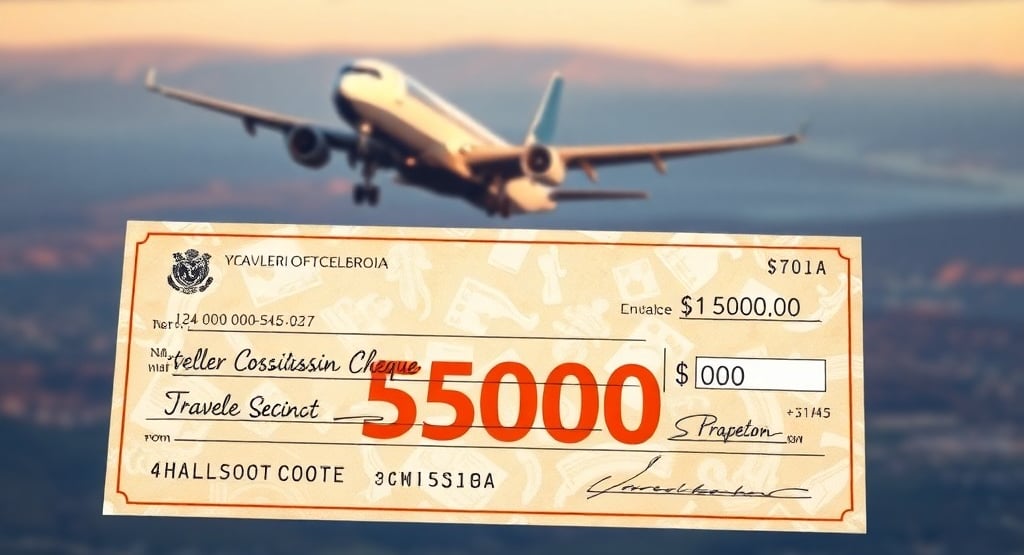Are Travellers' Cheques Still a Good Option for Travel?
Once upon a time, before smartphones, chip-and-PIN cards, and global ATMs, travelers' cheques were a must-have item for anyone heading abroad. They were the go-to solution for carrying money securely overseas, providing a safety net in case of theft or loss. But fast-forward to the digital age, many wonder if travellers' cheques are still useful in 2025. Discover where they work, their pros & cons, and smarter money alternatives for travel.
4/30/20254 min read
A Quick History of Travellers Cheques
Travellers cheques (or “travelers checks” in the U.S.) were first introduced in the 19th century and became popular through the 20th century. They were issued by major financial institutions like American Express, Visa, and Thomas Cook, and provided a safer alternative to carrying large amounts of cash.
Each cheque had a fixed amount, such as $20, $50, or $100, and was signed upon purchase and again when being cashed or used. If lost or stolen, travellers could report them and have them replaced, often within 24 hours. They were accepted at banks, hotels, and some stores and restaurants around the world.
For decades, they were considered the pinnacle of travel safety and convenience. But then came the ATM revolution, followed by digital banking and mobile wallets.
Are Travellers Cheques Still Used Today?
The short answer is: yes, but very rarely. Their use has significantly declined over the past two decades due to more modern and efficient alternatives.
Why Their Popularity Declined
Global ATM Access: Today, international travellers can access their funds almost anywhere using ATMs. Most major cities and even small towns have machines that accept debit and credit cards from global networks like Visa, Mastercard, and Cirrus.
Credit and Debit Card Convenience: These days, people are more likely to use credit and debit cards for purchases and services abroad. Contactless payments, fraud protection, and easy spending tracking make plastic more attractive than paper.
Digital Wallets and Apps: Mobile banking apps, Apple Pay, Google Pay, and even travel-specific apps like Revolut or Wise offer seamless ways to spend and transfer money internationally.
Declining Acceptance: Many banks and businesses have stopped accepting travellers cheques, and even when they do, the process can be slow and tedious.
Are There Any Situations Where Travellers Cheques Still Make Sense?
Despite their obsolescence in most cases, travellers cheques aren’t completely extinct. There are still a few niche scenarios where they may be useful:
1. Travel to Remote Destinations
In very remote regions—where there are few ATMs or no internet access—travellers cheques may still offer some value, especially if cash is unavailable or unreliable.
2. Backup Emergency Funds
Some cautious travellers carry a couple of travellers cheques as backup in case cards are stolen, lost, or blocked by the bank. Unlike lost cash, travellers cheques can be replaced quickly.
3. Security Over Cash
Travellers cheques offer an extra layer of security. If you're concerned about pickpockets or hotel thefts, cheques can be less risky than large amounts of cash.
4. Senior Travellers or Habitual Users
Some older travellers who are more comfortable with traditional methods may still prefer using travellers cheques. Long-time American Express customers, for example, may stick to what they know.
Where Can You Still Buy Travellers' Cheques?
Travellers cheques are harder to find than they used to be, but they are not completely unavailable. Here's where you might still get them:
American Express still issues them, though you'll need to check availability in your country.
Banks: Some major banks like Wells Fargo or Bank of America may offer them to account holders.
Currency Exchange Services: A few money exchange providers at airports or in large cities may still deal in travellers cheques.
Important: Always check in advance, as availability varies by region and institution.
Can You Still Cash or Use Them Abroad?
If you’re holding onto old travellers cheques or considering using them during your next trip, here's what you need to know:
Acceptance is Limited: Few retailers accept them directly. However, major banks in popular tourist destinations may still cash them—especially in places like Japan or parts of the U.S.
Fees May Apply: You may be charged a conversion or cashing fee, making them less economical than card or app-based alternatives.
Identification Required: You’ll almost always need to show ID (usually a passport) to cash them.
In short, don’t rely on travellers cheques as your primary source of funds unless you’ve done your homework and confirmed where they’re accepted.
Alternatives to Travellers Cheques
If you're looking for safer, faster, and more widely accepted alternatives, here are your best bets:
1. Prepaid Travel Cards
These cards allow you to preload multiple currencies, lock in exchange rates, and use them like debit cards abroad. They also often include app tracking and emergency assistance.
Examples: Wise (formerly TransferWise), Revolut, Travelex Money Card.
2. Multi-Currency Accounts
Digital banks like Wise and Revolut offer multi-currency accounts that let you hold and spend in multiple currencies, often with better exchange rates than traditional banks.
3. Credit Cards with No Foreign Transaction Fees
Cards like the Chase Sapphire Preferred, Capital One Venture, or Barclaycard Rewards are designed for travellers and don’t charge extra fees for foreign transactions.
4. Cash Withdrawals from ATMs
Withdrawing cash as you go is still one of the most practical ways to manage travel expenses—just be aware of ATM fees and bank charges. Using a card that reimburses international ATM fees can help.
5. Mobile Payment Apps
Apple Pay, Google Pay, and even PayPal are becoming more widely accepted internationally, especially in tech-forward countries.
Should You Use Traveller's Cheques in 2025?
Let’s recap the pros and cons.
Pros:
Safe alternative to carrying cash
Replaceable if lost or stolen
May still be useful in remote or offline destinations
Cons:
Limited acceptance globally
Time-consuming to use and cash
Better, faster, and cheaper options now exist
Verdict: Travellers cheques are largely outdated. In most cases, you're better off with digital tools, cards, and cash withdrawals. However, if you’re venturing into very remote areas or want a secure backup option, they might still have a small role to play.
Final Thoughts
Travellers cheques were once a symbol of world exploration and responsible travel. Today, they’re more a relic than a reality—but not entirely forgotten. They still carry a nostalgic appeal and, for a select few scenarios, may even be practical.
Still, for the modern globetrotter, the best tools now fit in your wallet—or your phone. With a mix of travel cards, mobile banking, and careful planning, you can explore the world with ease, convenience, and peace of mind—no cheques required.


Contact us
Copyright © 2025. Ralnoscape All rights reserved.
Destinations
Resources


Follow us
This website uses affiliate links which may earn a commission at no additional cost to you
